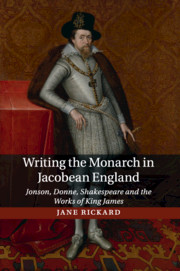Book contents
- Writing the Monarch in Jacobean England
- Writing the Monarch in Jacobean England
- Copyright page
- Contents
- Book part
- Note on texts
- Glossary
- Introduction
- Part I James, Jonson and the Jacobean Court
- Part II James, Donne and the Politics of Religion in Jacobean England
- Part III James, Shakespeare and the Jacobean Theatre
- Chapter 5 ‘Let him but be testimonied in his own bringings-forth’: Shakespeare, James and constructing the King
- Coda: appropriating the royal word in the 1620s and beyond
- Select bibliography
- Index
Coda: appropriating the royal word in the 1620s and beyond
from Part III - James, Shakespeare and the Jacobean Theatre
Published online by Cambridge University Press: 05 October 2015
- Writing the Monarch in Jacobean England
- Writing the Monarch in Jacobean England
- Copyright page
- Contents
- Book part
- Note on texts
- Glossary
- Introduction
- Part I James, Jonson and the Jacobean Court
- Part II James, Donne and the Politics of Religion in Jacobean England
- Part III James, Shakespeare and the Jacobean Theatre
- Chapter 5 ‘Let him but be testimonied in his own bringings-forth’: Shakespeare, James and constructing the King
- Coda: appropriating the royal word in the 1620s and beyond
- Select bibliography
- Index
Summary
- Type
- Chapter
- Information
- Writing the Monarch in Jacobean EnglandJonson, Donne, Shakespeare and the Works of King James, pp. 250 - 259Publisher: Cambridge University PressPrint publication year: 2015



